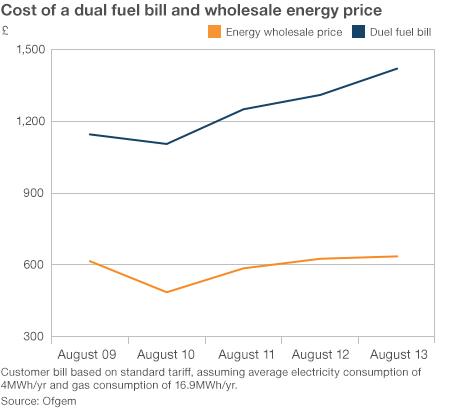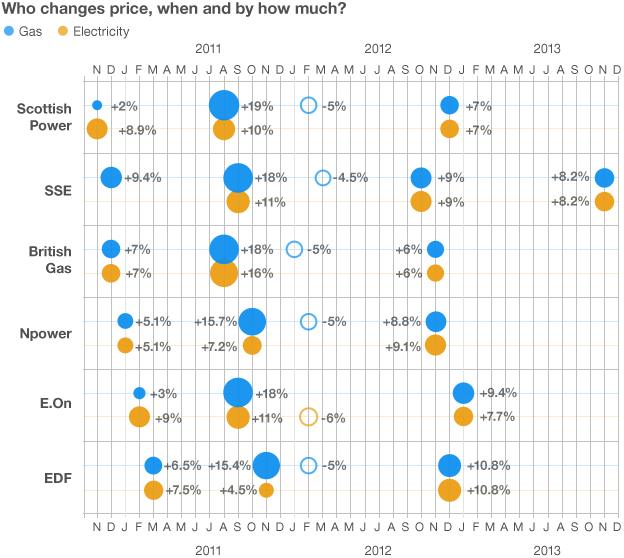SSE to raise gas and electricity prices by 8.2%
- Published
- comments
"We make about 5% margin... that's not the reason why prices are going up" - SSE Director of Customer Services Tony Keeling
SSE customers will see an average 8.2% rise in gas and electricity prices from 15 November, the company has announced.
The energy firm said the rise reflected higher costs of buying wholesale energy and paying to deliver it to customers' homes, plus government levies.
The price rises will affect about 4.4 million electricity customers and 2.9 million gas customers, not including those on fixed-price tariffs.
SSE's average annual dual-fuel energy bill will rise by £106 to £1,380.
Business and Energy Minister Michael Fallon said he was "disappointed" by SSE's decision to increase energy prices.
He told BBC Radio 5 live: "I would encourage all customers to look again at their tariffs and see whether they can switch to a cheaper tariff."
He added the long-term answer to high energy bills was "more competition and encouraging consumers to shop around".
Caroline Flint, shadow energy secretary, said: "When times are tough energy companies should be helping their customers not hitting them with more price rises to boost their profits."
'We're sorry'
The company said, external that 8.2% was an average rise. Customers in the North of England and central Scotland would see the smallest increase, of 7%, in their dual fuel price. Customers in the South East of England would see the biggest, up 9.7%.
SSE last increased its prices a year ago. It has now pledged not to raise them again before autumn 2014.
"We're sorry we have to do this," said SSE's Will Morris.
"We've done as much as we could to keep prices down, but the reality is that buying wholesale energy in global markets, delivering it to customers' homes, and government-imposed levies collected through bills - endorsed by all the major parties - all cost more than they did last year."
SSE, made up of Southern Electric, Swalec and Scottish Hydro, said that for a typical dual-fuel customer, wholesale energy prices had gone up 4%, paying to use delivery networks was 10% more expensive, and government levies were 13% higher.
About two-thirds of a household fuel bill goes on the cost of wholesale energy, the cost of running an energy sales business, and on the companies' profits.

Up to 11% goes on government programmes to save energy, reduce emissions and tackle climate change, according to regulator Ofgem. SSE said it wanted this to be included in general taxation, rather than added to bills.
However, Energy Secretary Ed Davey said: "Half of an average energy bill is made up of the wholesale cost of energy. This far outweighs the proportion of a bill that goes to help vulnerable households with their bills and to cut energy waste."
The latest calculations from the regulator found that the average profit margin made by an energy supplier on an average £1,315 bill is £65.
However, this figure can be volatile. The snapshot profit margin has risen above £100, but has also fallen to a negative figure at certain points in recent years.
Political row
Profit levels prompted Labour leader Ed Miliband to declare that gas and electricity bills would not go up for 20 months if Labour won the 2015 election.
Prime Minister David Cameron condemned the pledge as a "gimmick", saying the government was simplifying bills to make it easier for consumers to switch suppliers and encourage competition.
SSE, formerly Scottish and Southern Energy, said it expected its annual profit margin to average about 5% over a three-to-five-year period, which it believed was "a fair amount".
It said its profit margin was 4.2% in the 2012-13 financial year and was expected to fall short of the 5% target again this year.
"We know we will come in for a great deal of criticism for this decision and politicians will no doubt be lining up to condemn us," said SSE's Mr Morris.
"But over many years, policymakers themselves have failed to highlight adequately the cost to consumers of the policies they have pursued in government.
"They can't expect to have power stations replaced with new technologies, the network to be upgraded and nationwide energy efficiency schemes all to be funded for free.
"And as an energy provider, we are in the unenviable position of having to pass this cost on to consumers through energy bills."
The announcement comes about a year after the last set of gas and electricity price rises.
Between August and December 2012, the "big six" energy companies outlined price rises of between 6% and 10.8%.

At that time, the companies blamed rising wholesale prices, the cost of transporting energy to homes, and the increasing cost of government social schemes for the increases.
Advice line National Debtline said it had received a record 15,502 calls from people seeking help with energy debts in the first six months of this year. This was up 10% on last year.
Adam Scorer, of watchdog Consumer Futures, said: "SSE and others who follow need to demonstrate why this rise is justified."